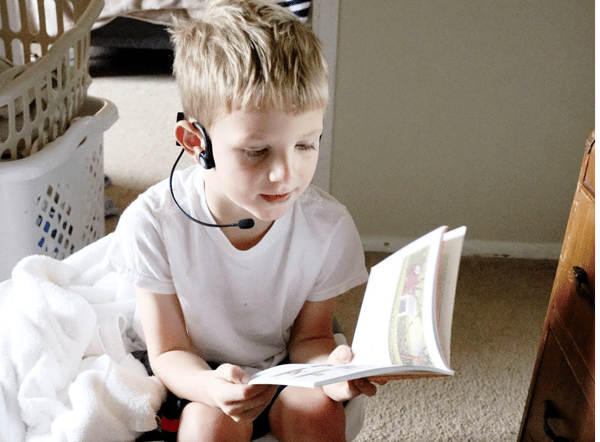What to Do If Your Child Stutters
Between the ages of two and five, many children will go through a temporary phase during which they struggle to pronounce words, get stuck on syllables, or show other signs of interrupted, non-fluent speech. The medical term for this is developmental stuttering. This post discusses how to cope with stuttering that is not part of this temporary period and thus, prolonged (Learn about other speech disorders here).
Stuttering is a specific kind of dysfluency that includes repetitions, prolongations, and blocks (inability to produce sound) during speech.

By age five, these symptoms usually diminish on their own or disappear completely. However, if your child is still displaying symptoms of stuttering beyond five years old, then they may need extra help to encourage speech development. A Speech-Language Pathologist can usually determine a stuttering problem after one thorough speech and language evaluation. Referrals are typically made by primary care physicians or school districts.
Red Flags for Stuttering
Certain characteristics of stuttering can help us understand whether a child is moving through a typical “period” of dysfluency or is likely to have a true dysfluency that requires intervention. Some characteristics of a true dysfluency include:
- The child continues to stutter beyond age five.
- Stuttering is occurring on final sounds in a word (e.g., “brother-er-er-er”).
- It is difficult to understand what the child is trying to say because of the stuttering.
- There are other speech or language problems.
- There is a co-existing disability related to learning, attention, or motor skills.
- In combination with any of the characteristics above, there is a family history of stuttering.
Why Do Children Stutter?
In order to understand how to manage stuttering, it is important to learn more about what causes it. Your child's stutter may be caused by:
- A genetic trait that impacts members of the family.
- Disrupted motor skills. This means that the child knows exactly what they want to say,but due to a disconnect between the brain and structures used for speech (vocal cords, tongue, lips, etc.) they are unable to remain fluent.
- Developmental setbacks. Learning delays or disorders can often directly lead to speech disturbances.
- Having a hyperactive mind. If your child's brain is working faster than their mouth, then they may develop a stutter.
How to Help Your Child
As a parent, there are a number of things that you can do to help your child cope with stuttering :
- Remain patient with your child at all times. When you are doing something that helps, your child will appear calmer and be more willing to continue to communicate with you.
- Speak with a trained speech therapist who has experience working with children who stutter. They can teach you and your child useful techniques for overcoming stu It is important that you take an active role in therapy as well. A well-developed home program will support your child’s success in therapy and help them master their new speech techniques.
- Consider a program such as the one used with Forbrain This product is proven to help children familiarize themselves with their own speech patterns while increasing awareness, decreasing misarticulations, and improving confidence in speaking situations.
- Familiarize yourself with all things stuttering-related. Read information and current A good place to start is stutteringhelp.org
- Become actively involved with your child’s Speak to their teacher about their stuttering and be attentive of their performance. This will allow you the ability to advocate for your child and ensure an optimal learning environment.

Coping with a stutter is a challenge for your child, and unfortunately there is no magic cure. Becoming actively involved in their therapy and education, you can help them manage their challenges. By providing them with your love, support, and patience, your child will gradually become a more confident, effective speaker.

.png?width=1900&name=blog_banner%20(1).png)

.jpg)
